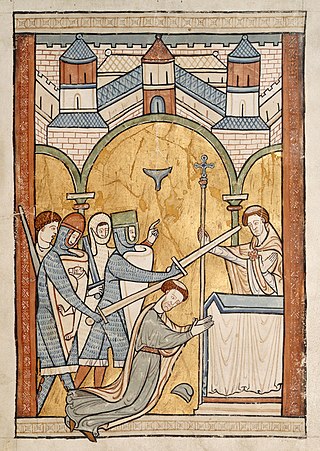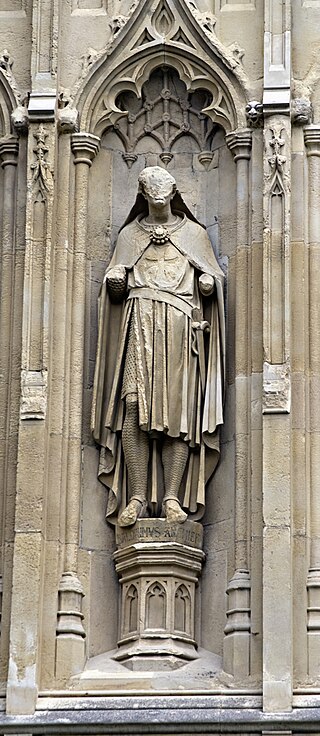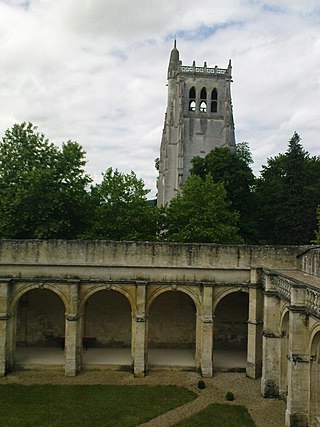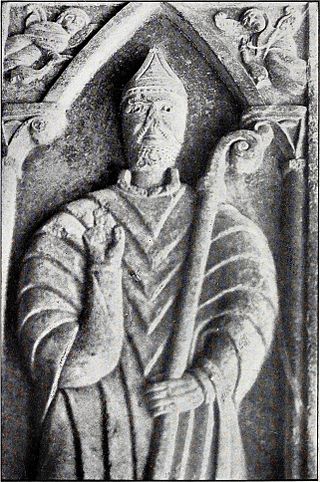Related Research Articles

Thomas Becket, also known as Saint Thomas of Canterbury, Thomas of London and later Thomas à Becket, served as Lord Chancellor from 1155 to 1162, and then notably as Archbishop of Canterbury from 1162 until his death in 1170. He engaged in conflict with Henry II, King of England, over the rights and privileges of the Church and was murdered by followers of the King in Canterbury Cathedral. Soon after his death, he was canonised by Pope Alexander III. He is venerated as a saint and martyr by the Catholic Church and the Anglican Communion.
Theobald of Bec was a Norman archbishop of Canterbury from 1139 to 1161. His exact birth date is unknown. Some time in the late 11th or early 12th century Theobald became a monk at the Abbey of Bec, rising to the position of abbot in 1137. King Stephen of England chose him to be Archbishop of Canterbury in 1138. Canterbury's claim to primacy over the Welsh ecclesiastics was resolved during Theobald's term of office when Pope Eugene III decided in 1148 in Canterbury's favour. Theobald faced challenges to his authority from a subordinate bishop, Henry of Blois, Bishop of Winchester and King Stephen's younger brother, and his relationship with King Stephen was turbulent. On one occasion Stephen forbade him from attending a papal council, but Theobald defied the king, which resulted in the confiscation of his property and temporary exile. Theobald's relations with his cathedral clergy and the monastic houses in his archdiocese were also difficult.
Richard was a medieval Benedictine monk and Archbishop of Canterbury. Employed by Thomas Becket immediately before Becket's death, Richard arranged for Becket to be buried in Canterbury Cathedral and eventually succeeded Becket at Canterbury in a contentious election. Much of Richard's time as archbishop was spent in a dispute with Roger de Pont L'Evêque, the Archbishop of York over the primacy of England, and with St Augustine's Abbey in Canterbury over the archbishop's jurisdiction over the abbey. Richard had better relations with King Henry II of England than Becket had and was employed by the king on diplomatic affairs. Richard also had the trust of the papacy and served as a judge for it. Several of his questions to Pope Alexander III were collected into the Decretals, a collection of ecclesiastical laws, and his patronage of canon lawyers did much to advance the study of canon law in England.

Thomas Tenison was an English church leader, Archbishop of Canterbury from 1694 until his death. During his primacy, he crowned two British monarchs.

William Fitzstephen, was a cleric and administrator in the service of Thomas Becket. In the 1170s he wrote a long biography of Thomas Becket – the Vita Sancti Thomae.
Robert of Melun was an English scholastic Christian theologian who taught in France, and later became Bishop of Hereford in England. He studied under Peter Abelard in Paris before teaching there and at Melun, which gave him his surname. His students included John of Salisbury, Roger of Worcester, William of Tyre, and possibly Thomas Becket. Robert was involved in the Council of Reims in 1148, which condemned the teachings of Gilbert de la Porrée. Three of his theological works survive, and show him to have been strictly orthodox.

Roger de Pont L'Évêque was Archbishop of York from 1154 to 1181. Born in Normandy, he preceded Thomas Becket as Archdeacon of Canterbury, and together with Becket served Theobald of Bec while Theobald was Archbishop of Canterbury. While in Theobald's service, Roger was alleged to have committed a crime which Becket helped to cover up. Roger succeeded William FitzHerbert as archbishop in 1154, and while at York rebuilt York Minster, which had been damaged by fire.

Baldwin of Forde or Ford was Archbishop of Canterbury between 1185 and 1190. The son of a clergyman, he studied canon law and theology at Bologna and was tutor to Pope Eugene III's nephew before returning to England to serve successive bishops of Exeter. After becoming a Cistercian monk he was named abbot of his monastery at Forde and subsequently elected to the episcopate at Worcester. Before becoming a bishop, he wrote theological works and sermons, some of which have survived.

Reginald Fitz Jocelin was a medieval Bishop of Bath and an Archbishop of Canterbury-elect in England. A member of an Anglo-Norman noble family, he was the son of a bishop, and was educated in Italy. He was a household clerk for Thomas Becket, but by 1167 he was serving King Henry II of England. He was also a favourite of King Louis VII of France, who had him appointed abbot of the Abbey of Corbeil. After Reginald angered Becket while attempting to help negotiate a settlement between Becket and the king, Becket called him "that offspring of fornication, that enemy to the peace of the Church, that traitor." When he was elected as a bishop, the election was challenged by King Henry's eldest son, Henry the Young King, and Reginald was forced to go to Rome to be confirmed by Pope Alexander III. He attended the Third Lateran Council in 1179, and spent much of his time administering his diocese. He was elected Archbishop of Canterbury in 1191, but died before he could be installed.
Gerard la Pucelle was a peripatetic Anglo-French scholar of canon law, clerk, and Bishop of Coventry.

Edward Grim was a monk from Cambridge who visited Canterbury Cathedral on Tuesday 29 December 1170 when Thomas Becket was murdered. He researched and published a book, Vita S. Thomae in about 1180, which is today known chiefly for a short section in which he gave an eyewitness account of the events in the cathedral.
Roger of Worcester was Bishop of Worcester from 1163 to 1179. He had a role in the controversy between Henry II of England, who was Roger's cousin, and Archbishop Thomas Becket.
Richard Peche was a medieval Bishop of Lichfield.

Hugh Nonant was a medieval Bishop of Coventry in England. A great-nephew and nephew of two Bishops of Lisieux, he held the office of archdeacon in that diocese before serving successively Thomas Becket, the Archbishop of Canterbury and King Henry II of England. Diplomatic successes earned him the nomination to Coventry, but diplomatic missions after his elevation led to a long delay before he was consecrated. After King Henry's death, Nonant served Henry's son, King Richard I, who rewarded him with the office of sheriff in three counties. Nonant replaced his monastic cathedral chapter with secular clergy, and attempted to persuade his fellow bishops to do the same, but was unsuccessful. When King Richard was captured and held for ransom, Nonant supported Prince John's efforts to seize power in England, but had to purchase Richard's favour when the king returned.

Bartholomew of Exeter was a medieval Bishop of Exeter. He came from Normandy and after being a clerk of the Archbishop of Canterbury, was made Archdeacon of Exeter in 1155. He became Bishop of Exeter in 1161. Known for his knowledge of canon law, he was involved in the Becket controversy after the appointment of Thomas Becket as Archbishop of Canterbury. After Becket's death, although he was frequently at the royal court, he mainly attended to his diocese. A number of works by him survive, including sermons and treatises on law and theology.

John of Canterbury was Bishop of Poitiers 1162 to 1181 and subsequently Archbishop of Lyon 1181 to 1193. He became a "cosmopolitan and much-respected churchman".

Matilda of England was an English princess of the House of Plantagenet and by marriage Duchess consort of Saxony and Bavaria from 1168 until her husband's deposition in 1180.
Ælric, perhaps a misspelling of Ælfric or Æthelric, archbishop-elect of Canterbury, was a kinsman of Godwin, Earl of Wessex.

Richard Barre was a medieval English justice, clergyman and scholar. He was educated at the law school of Bologna and entered royal service under King Henry II of England, later working for Henry's son and successor Richard I. He was also briefly in the household of Henry's son Henry the Young King. Barre served the elder Henry as a diplomat and was involved in a minor way with the king's quarrel with Thomas Becket, which earned Barre a condemnation from Becket. After King Henry's death, Barre became a royal justice during Richard's reign and was one of the main judges in the period from 1194 to 1199. After disagreeing with him earlier in his career, Barre was discharged from his judgeship during John's reign as king. Barre was also archdeacon of Ely and the author of a work of biblical extracts dedicated to one of his patrons, William Longchamp, the Bishop of Ely and Chancellor of England.
Gervase of Chichester was an English clergyman and writer active in the late 12th century.
References
- Introduction to vol. III of the Materials
- Norgate, Kate (1885–1900). . Dictionary of National Biography . London: Smith, Elder & Co.
- L'Huillier, St. Thomas de Canterbury, I (Paris, 1891), note A.
- Herbermann, Charles, ed. (1913). . Catholic Encyclopedia . New York: Robert Appleton Company.